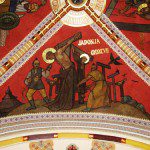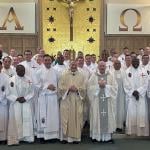Those who try to make themselves great in the eyes of others, those who put on shows of greatness for the sake of vainglory and power, might appear to be great but in fact are truly nothing. All they do is put on a show of glory, hiding their emptiness through feigning greatness. Politicians use parlor tricks to hide the truth from the public, the truth that they are feeble, envious of others. They tend to lash out in anger at anyone who is truly great, because when put next to true greatness, their spectacle of greatness is easily seen through and demolished.
True greatness is found in humility, in those who do not seek glory for themselves. Someone who is truly great will not even think about making themselves appear great.
Jesus told us about true greatness when he pointed to St. John the Baptist: “I tell you, among those born of women none is greater than John; yet he who is least in the kingdom of God is greater than he” (Lk. 7:28 RSV). John was great, and his greatness was found in his willingness to be the least among his people, going out in the wilderness and living an ascetic life. “Now John wore a garment of camel’s hair, and a leather girdle around his waist; and his food was locusts and wild honey” (Matt. 3:4 RSV).
Note John’s unfashionable clothes and his simple eating habits. Note, moreover, how he lived alone, not seeking crowds, not desiring to be known as great among the people. He left society and all its false glory so that he could live a simple life following God. He was great, and that greatness came in his rejection of all the sham society puts forward as great.
Yet, no matter how great John was while he dwelt upon the earth, greater glory, true glory is found in the kingdom of heaven. The lowest in the kingdom of heaven will find their greatness will transcend John’s earthly glory (but, to be clear, this does not say John will be low in the kingdom of heaven, rather, whatever glory he had while on earth is less than the gory of anyone who has attained the kingdom of heaven).
![Saint John the Baptist by Prokopiy Chirin [Public domain], via Wikimedia Commons](https://wp-media.patheos.com/blogs/sites/637/2017/01/John_the_Baptist_by_Prokopiy_Chirin_1620s_GTG-249x300.jpg)
You yourselves bear me witness, that I said, I am not the Christ, but I have been sent before him. He who has the bride is the bridegroom; the friend of the bridegroom, who stands and hears him, rejoices greatly at the bridegroom’s voice; therefore this joy of mine is now full. He must increase, but I must decrease (Jn. 3:28-30 RSV).
John, representing the best of us, shows us how we must let God be God, let God increase his glory in the world. We do this by letting ourselves decrease. We must not seek glory for ourselves in the eyes of others, but rather, we must seek God and love God and love others in and with our love for God. That is where we find true greatness. In such love, grace flows, the grace of the kingdom of God.
Greatness is found in stillness and silence, not in the blasts of trumpets, the cries of heralds, nor in the force of might and arms pushing at others, nor especially in vainglorious deeds. If what we do has some good in it, but is done for the sake of making ourselves look great with the pretense of being holy and righteous, all we do is hide from others, and possibly ourselves, the emptiness which resides within.
To seek worldly greatness is to make nothing of oneself, while to seek nothingness for oneself in the world is to find true greatness in the kingdom of God.
“For if any one thinks he is something, when he is nothing, he deceives himself” (Gal. 6:3 RSV). Self-deception is the rule in a world run on appearances. Anything and everything which knocks at the illusion is itself a threat, and quickly attacked by those who would make themselves great. Those who would make themselves out to be somebody because of their riches, because of the power they have accumulated for themselves, because of whatever deeds they think they might have done which they think makes them better than others, or because of accidents such as race, gender, place of birth or the like, must come to realize it is all illusory, and they are deceiving themselves so long as they hold on to that illusion. Deep within, most realize this, which is why they strike out at anyone who places the light of truth before them, hoping to snuff out that light before others catch on and see them for the little sniveling nothings they truly are.
St. Jerome, in explaining what Paul meant in Galatians, made it very clear, selfishness is to be rejected; we are not to put ourselves first, but (as the surrounding verses indicate), we must share the burdens of others and work for the greatness of all. To put oneself up as “me first,” using others to “make myself great again” is what should show us we have indeed become nothing:
That person deceives himself if he is not interested in carrying out another’s burdens but is content only with his own work, and virtue, and seeks his own good but not the good of others, and (in other words) only loves himself and not God as well. [1]
If we seek to make ourselves great, even if we do it through the show of apparent virtues, if what we do is for ourselves and our own glory, such selfishness closes us from the grace of God, and so we become empty of true glory and therefore nothing. Thus, Jerome continued:
If anyone thinks he is something, such that he is content with only his own virtue and judges himself according to his own work and effort and not according to kindness shown towards his neighbor, he becomes nothing through this very arrogance and deceives himself.[2]
Those who glorify in themselves truly have nothing to stand on. To glorify oneself is to cut out all those who helped someone achieve greatness, especially God, and to try to stand with the merits they possess from their own doing; and it is for this reason, it always leads to a fall. This is the lesson we can learn from Isaiah:
All of them will speak and say to you: `You too have become as weak as we! You have become like us!’ Your pomp is brought down to Sheol, the sound of your harps; maggots are the bed beneath you, and worms are your covering. “How you are fallen from heaven, O Day Star, son of Dawn! How you are cut down to the ground, you who laid the nations low! You said in your heart, `I will ascend to heaven; above the stars of God I will set my throne on high; I will sit on the mount of assembly in the far north; I will ascend above the heights of the clouds, I will make myself like the Most High.’ But you are brought down to Sheol, to the depths of the Pit. Those who see you will stare at you, and ponder over you: `Is this the man who made the earth tremble, who shook kingdoms, who made the world like a desert and overthrew its cities, who did not let his prisoners go home?’ (Isa. 14:10-17 RSV).
The utterance of Isaiah, using the morning star, “Lucifer” as an example for the King of Babylon established the analogy which would later be used to represent the fall of Satan, the angel who thought of himself to be so high and mighty, so glorious, that he thought he could oppose God only to fall down and literally be sent to hell (cf. Lk. 10:18; Rev. 12:7-13. While we can and must understand the prophecy of Isaiah to be about the King of Babylon, it also serves as exemplar of the way all glory falls when it is sought out in pride.
If we want to be great, we must therefore avoid the temptation of self-glorification. To find true glory, we must love and be loved, and let true glory manifest itself in and through us as the kingdom of God is found within the humility of love. Anything else will come crashing down, revealing the nothingness which remains. Truly, as the Preacher declared the outcome of such work for glory is vanity (Eccl. 1:2-11), nothing to be desired, for it makes leaves someone with nothing.
[1] St Jerome, Commentary on Galatians. trans. Andrew Cain (Washington, DC: Catholic University of America Press, 2010), 251.
[2] Ibid., 251.
Stay in touch! Like A Little Bit of Nothing on Facebook:
A Little Bit of Nothing












